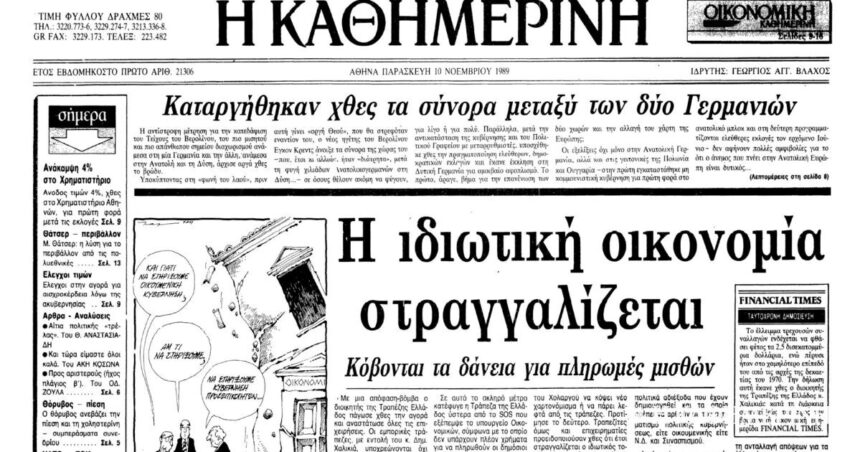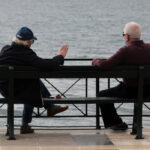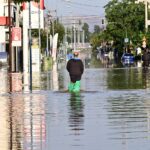“The wall of shame fell. The dream has come true and the Germans are laughing and singing happily,” wrote Kathimerini on November 11, 1989. The wall that separated Berlin, the historic Prussian capital, was no longer standing to prevent the movement of Germans from the West to the West. eastern part and the opposite. The Cold War was in its final stages and one of its symbols collapsed, just as the communist regimes in Eastern Europe collapsed one after the other.
In the early 1960s, the world experienced two of the most important crises of the Cold War, the Berlin Crisis and the Cuban Missile Crisis. The Berlin crisis culminated in the summer of 1961, when on the night of 12her to 13the August the East Germans, having first obtained the approval of the Soviets, isolated the West Berlin area from East Germany. A little later they erected the famous Wall, which prevented communication between the two parts of the city.
In the past, it had been a constant demand of the Soviet side to turn Berlin into a free city, something Soviet leader Nikita Khrushchev emphasized to US President John F. Kennedy at their meeting in June 1961. The ever-increasing flow of people, the who were choosing to escape through West Berlin to the Federal Republic of Germany (West Germany), necessitated the construction of the wall for East Germans.
Westerners called the Berlin Wall the “Wall of Shame”, which they used as an argument to demonstrate the oppressive nature of the Eastern Bloc. Kennedy himself, speaking in front of the Wall in 1963, a few months before his assassination, denounced the policy of oppression pursued by the Soviets and their allies, declaring “Ich bin ein Berliner” (I am also a Berliner). Many were those who lost their lives trying to cross into West Berlin. “Charlie’s outpost”, a point of communication between the two sectors of the city, took on legendary proportions in the West.
In 1989 a powerful wind of change shook the whole of Eastern Europe. At the helm of the Soviet Union was the reformist politician Mikhail Gorbachev, who attempted to reform his country while also trying to set an example for other communist states. The ventures of perestroika and glasnost ultimately failed. However, they gave the people the opportunity to express their desire to change the existing regime.
The East Germans’ demand for democratization was not heeded by the country’s leadership. The leader of the German Democratic Republic, Erich Honecker, did not proceed with the necessary reforms, as Gorbachev had advised him. His replacement, Egon Krenz, failed to change the situation that had been created. The momentum of the movement for change in East Germany was enormous. On November 9, the opening of the border crossings in Berlin was announced.
Stunned East Germans, as soon as they watched live on their televisions the speech of CC Politburo member Gunder Szabowski, took to the streets. A few hours later, the gates of the “Bornholmer Straße” border post were opened and the first East Germans crossed the Wall. Images of joy and emotion overwhelmed those passing through the western sector. There were West Germans, friends and relatives of many East Germans, who welcomed them.
“Mixed emotions, excitement and satisfaction, intense astonishment, but also veiled concern, characterize the reactions of the governments of the West, as the shocking changes taking place in Eastern Europe, essentially seal the end of one world and the birth of another. Once again, in the last few weeks, one has the impression that the pace of developments has outstripped the ability of the human mind to predict and react,” wrote “Kathimerini” on November 11, 1989, commenting on the West’s reaction to the new developments.
As the newspaper’s Washington correspondent at the time, Alexis Papachelas, pointed out, “for 28 years, from President Kennedy onwards, the Berlin Wall was the most powerful symbol in the rhetoric of Western leaders. But now that the wall has come down, Washington seems embarrassed and unprepared to deal with the consequences. President Bush was rather nervous and if anything restrained when he called White House reporters into his office on Thursday afternoon. The American leader indirectly warned about the stabilizing consequences that either the acceleration of developments in Central Europe, or the obvious American intervention, could have and asked the citizens of East Germany not to leave their country.
The fall of the Wall was followed by the fall of communist leaders such as Todor Zhivkov in Bulgaria and Nicolae Ceausescu in Romania. The latter, in fact, was arrested, tried and executed together with his wife Elena on Christmas 1989. Europe since then was a different continent.
Column editor: Myrto Katsigera, Vassilis Minakakis, Antigone-Despina Poimenidou, Athanasios Syroplakis







